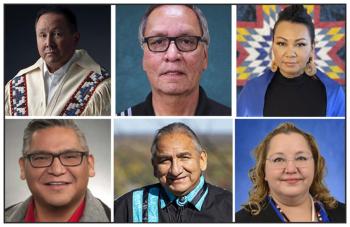Image Caption
Summary
Local Journalism Initiative Reporter
Windspeaker.com
Contenders for national chief of the Assembly of First Nations are hitting back against Ottawa’s proposed work to define the Indian status of First Nation members.
Last week, Indigenous Services Canada Minister Patty Hajdu announced the establishment of an Indigenous advisory process that would inform the upcoming collaborative process on second-generation cut-off. This process, she said, is the next step in the co-development of reforms to address status inequities that remain within the Indian Act.
This work follows in the wake of Bill C-38, the latest amendments to the Indian Act. It was debated in parliament for second reading on Oct. 20.
The Bill aims to remedy the inability of those with a family history of enfranchisement (their Indian status having been terminated) to transmit status to descendants in the same way that those without a history of enfranchisement are able to. However, it does not address the second-generation cut-off of section 6(2).
Being registered under 6(2) means an individual can only transmit Indian status to their child if the child’s other parent also has status. Entitlement to registration under the Indian Act is lost after two successive generations of parenting with a person not entitled to registration. This is commonly known as the second-generation cut-off.
So, a person registered under section 6(1) of the Indian Act, meaning a person with Indian status, who parents with a non-status person, has a child who is entitled to Indian status registration. However, a person registered under section 6(2), who parents with a non-status person, has a child who is not entitled to Indian status registration.
In a recent analysis of the Bill, the Native Women’s Association of Canada described the imposition of the second-generation cut-off by parliament as “demeaning.” NWAC said it infringes on First Nations’ rights to determine their own membership.
All six contenders for the highest position in the AFN said the government needed to butt out of the business of First Nations determining who their members are.
The candidates were responding to a question asked during a leadership forum held by Manitoba Keewatinowi Okimakanak Nov. 29.
“It’s about who’s status in our community. (Are they) 6(1) or 6(2)?” said Bunibonibee Cree Nation Councillor Horace Crane.
“In future generations, if nothing is done…there's not going to be any status Indians,” Crane told the candidates.
“What you're talking about is about racism,” said candidate Sheila North, former Manitoba Keewatinowi Okimakanak grand chief. “It's about assimilation, continued assimilation. And we know that that's a tactic that the government has been trying to play in our families and interfere in our families over and over again using legislation.”
“It’s a racist system,” agreed former Muskowekwan First Nation chief, candidate Reginald Bellerose.
He said the system had caregivers, many of them grandmothers, “trying to chase down” parents to get signatures on forms so their grandchildren can get benefits.
“It's urgent and it's critical,” said Bellerose.
North called for a moratorium on federal legislation that didn’t honour First Nations treaties and inherent rights.
“We don’t want co-legislation. We're hearing that across the country. We're not a department of the government. We are sovereign nations. We say who our people are. We say who we are and we stand on these treaties,” said North.
Candidate David Pratt, vice-chief with the Federation of Sovereign Indigenous Nations, said chiefs should be deciding their own memberships.
“We implement our own membership codes and we decide who our citizens are, not the government,” he said.
Former AFN regional chief for Alberta and candidate Craig Makinaw said First Nations needed to be proactive and take steps to ensure their membership was protected now and into the future.
“We need to tell the government that we are against what they're trying to do with membership and we need to find a way to get back to where our members were all members. There should be no more 6(1) (or) 6(2) members and members that don't have status. We need to change that now,” said Makinaw.
Candidate Cindy Woodhouse, former AFN regional chief for Manitoba, called for strong legal and political strategies to tackle the issue, which could also include court action.
“Every one of our families is affected by this now. We have children that are non-status. We have to fix this and we have to fix it once and for all,” said Woodhouse.
“The membership code…has to come from us and it has to come from our people and from within,” she said.
“Citizenship is our Creator-given right,” said candidate Dean Sayers, former chief of Batchewana First Nation.
He pointed out that the government had taken numerous steps in the past to “force people out of our communities” and remove their status.
“People…have actually been able to come home now. Yes, they've been added to the rolls, but the Crown hasn't paid the additional money that's owed to look after our people,” said Sayers.
“It's a lot of work to do and assertion of citizenship jurisdiction is priority,” he said.
Hajdu’s Indigenous advisory process will also look at section 10 on vote thresholds. Currently, a First Nation must obtain a double majority voting threshold to assume control of their membership. This means that the majority of those eligible to have voted came out to vote and the votes in favour outnumber the votes against. A double majority voting threshold has been identified as a barrier for nations.
Hajdu said consultation will take place in the upcoming months.
AFN chiefs will be voting for their new national chief on Dec. 6.
Windspeaker is owned and operated by the Aboriginal Multi-Media Society of Alberta, an independent, not-for-profit communications organization.
Each year, Windspeaker.com publishes hundreds of free articles focused on Indigenous peoples, their issues and concerns, and the work they are undertaking to build a better future.
If you support objective, mature and balanced coverage of news relevant to Indigenous peoples, please consider supporting our work. Whatever the amount, it helps keep us going.

